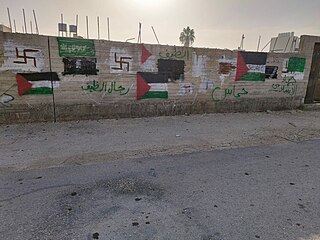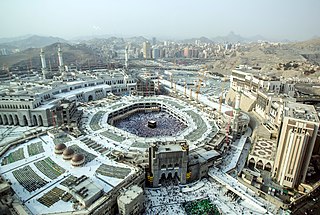Antisemitism has increased greatly in the Arab world since the beginning of the 20th century, for several reasons: the dissolution and breakdown of the Ottoman Empire and traditional Islamic society; European influence, brought about by Western imperialism and Arab Christians; Nazi propaganda and relations between Nazi Germany and the Arab world; resentment over Jewish nationalism; the rise of Arab nationalism; and the widespread proliferation of anti-Jewish and anti-Zionist conspiracy theories.
Scholars have studied and debated Muslim attitudes towards Jews, as well as the treatment of Jews in Islamic thought and societies throughout the history of Islam. Parts of the Islamic literary sources give mention to certain Jewish groups present in the past or present, which has led to debates. Some of this overlaps with Islamic remarks on non-Muslim religious groups in general.

The Kingdom of Saudi Arabia is an Islamic absolute monarchy in which Sunni Islam is the official state religion based on firm Sharia law. Non-Muslims must practice their religion in private and are vulnerable to discrimination and arrest. While no law requires all citizens to be Muslim, non-Muslim foreigners attempting to acquire Saudi Arabian nationality must convert to Islam. Children born to Muslim fathers are by law deemed Muslim.

Islam is the state religion of Saudi Arabia. The kingdom is called the "home of Islam"; it was the birthplace of the Islamic prophet Muhammad, who united and ruled the Arabian Peninsula. It is the location of the cities of Mecca and Medina, where Prophet Muhammad lived and died, and are now the two holiest cities of Islam. The kingdom attracts millions of Muslim Hajj pilgrims annually, and thousands of clerics and students who come from across the Muslim world to study. The official title of the King of Saudi Arabia is "Custodian of the Two Holy Mosques"—the two being Al-Masjid al-Haram in Mecca and Al-Masjid al-Nabawi in Medina—which are considered the holiest in Islam.

Abdul Rahman ibn Abdul Aziz al-Sudais, better known as al-Sudais, is the Chief Imam of the Grand Mosque, Masjid al-Haram in Makkah, Saudi Arabia; the President of the General Presidency for the Affairs of the Two Holy Mosques; a renowned Qāriʾ ; he was the Dubai International Holy Qur'an Award's "Islamic Personality Of the Year" in 2005. Al-Sudais has preached Islam's opposition to "explosions and terrorism", and has called for peaceful inter-faith dialogue, but also been criticized for vilifying non-Muslims and especially Jews in his sermons. He has denounced the treatment of Palestinians by Israeli settlers and the state of Israel, and called for more aid to be sent to Palestinians. He has also been noted for identifying women's un-Islamic behavior as in part responsible for the winter 2006 drought in Saudi Arabia. In 2016, he delivered the very important Hajj sermon to a multitude of pilgrims gathered at Arafat after prayers.

A Hajj passport was a special passport used only for entry into Saudi Arabia for the purpose of performing hajj. This passport is no longer used, as Saudi Authorities have required ordinary passports since 2009.
The Saudi Arabian textbook controversy refers to criticism of the content of school textbooks in Saudi Arabia following the September 11 attacks.
This is a list of countries where antisemitic sentiment has been experienced.

Articles related to Saudi Arabia include:

Jewish history in the territory of modern Saudi Arabia begins in classical antiquity.
Ali Abbas al-Ahmed (Arabic: علي عباس آل أحمد, Gulf pronunciation: ; born 1966, is a Saudi analyst focusing on the politics of the Persian Gulf region, including terrorism, Islamic movements, Wahhabi Islam, Saudi political history, Saudi Arabia–United States relations, and the history of the House of Saud family. He is the founder and director of the Institute for Gulf Affairs, formerly the Saudi Institute, an independent think tank in Washington, D.C., focused on providing analyses and disseminating information on political issues in the Persian Gulf region and particularly Saudi Arabia, and U.S.-Gulf relations. IGA also convenes conferences, conducts independent research and investigations, and works with the media and policymakers to foster a deeper understanding of Arab states of the Persian Gulf by providing them with up-to-date and exclusive information and connecting them with reliable analysts.
The article describes the state of race relations and racism in the Middle East. Racism is widely condemned throughout the world, with 174 states parties to the International Convention on the Elimination of All Forms of Racial Discrimination by April 8, 2011. In different countries, the forms that racism takes may be different for historic, cultural, religious, economic or demographic reasons.

Jami Mosque is a mosque in Toronto, Ontario, Canada. Located just east of High Park, it is the oldest Canadian Islamic centre in the city and dubbed "the mother of all the mosques in Toronto".

The destruction of heritage sites associated with early Islam is an ongoing phenomenon that has occurred mainly in the Hejaz region of western Saudi Arabia, particularly around the two holiest cities of Islam, Mecca and Medina. The demolition has focused on mosques, burial sites, homes and historical locations associated with the Islamic prophet Muhammad, his companions, and many of the founding personalities of early Islamic history by the Saudi government. In Saudi Arabia, many of the demolitions have officially been part of the continued expansion of the Masjid al-Haram at Mecca and the Prophet's Mosque in Medina and their auxiliary service facilities in order to accommodate the ever-increasing number of Muslims performing the pilgrimage (hajj).
The Protocols of the Elders of Zion is a fabricated antisemitic text purporting to describe a Jewish plan to achieve global domination. The text was fabricated in the Russian Empire, and was first published in 1903. While there is continued popularity of The Protocols in nations from South America to Asia, since the defeat of Nazi Germany, Fascist Italy, and Imperial Japan in World War II, governments or political leaders in most parts of the world have generally avoided claims that The Protocols represent factual evidence of a real Jewish conspiracy. The exception to this is the Middle East, where a large number of Arab and Muslim regimes and leaders have endorsed them as authentic. Past endorsements of The Protocols from Presidents Gamal Abdel Nasser and Anwar Sadat of Egypt, Iraqi President Arif, King Faisal of Saudi Arabia, and Colonel Muammar al-Gaddafi of Libya, among other political and intellectual leaders of the Arab world, are echoed by 21st century endorsements from the Grand Mufti of Jerusalem, Sheikh Ekrima Sa'id Sabri, and Hamas, to the education ministry of Saudi Arabia.

Racism in the Palestinian territories encompasses all forms and manifestations of racism experienced in the Palestinian Territories, of the West Bank, Gaza, and East Jerusalem, irrespective of the religion, colour, creed, or ethnic origin of the perpetrator and victim, or their citizenship, residency, or visitor status. It may refer to Jewish settler attitudes regarding Palestinians as well as Palestinian attitudes to Jews and the settlement enterprise undertaken in their name.

Masjid al-Haram, also known as the Sacred Mosque or the Great Mosque of Mecca, is considered to be the most significant mosque in Islam. It encloses the vicinity of the Kaaba in Mecca, in the Mecca Province of Saudi Arabia. It is among the pilgrimage sites associated with the Hajj, which every Muslim must perform at least once in their lives if able. It is also the main site for the performance of ʿUmrah, the lesser pilgrimage that can be undertaken any time of the year. The rites of both pilgrimages include circumambulating the Kaaba within the mosque. The Great Mosque includes other important significant sites, such as the Black Stone, the Zamzam Well, Maqam Ibrahim, and the hills of Safa and Marwa.

Ahmadiyya is a persecuted religion in Saudi Arabia. Although there are many foreign workers and Saudi citizens belonging to the Ahmadiyya movement in Saudi Arabia, Ahmadis are officially banned from entering the country and from performing the pilgrimage to Mecca and Medina. This has led to criticisms from multiple human rights organizations.
Abdullah ibn Abdur-Rahman al-Ghudayyan was a Saudi Arabian Islamic scholar, a leading proponent of the Salafi form of Islam and a member of the Saudi Council of Senior Scholars. His ancestry was of the tribe of Banu Anbar.

The General Presidency of Haramain, is a Saudi government agency responsible for the development and administration of the Islamic holy sites of the Masjid al-Haram and the Masjid an-Nabawi, facilitated by its religious, technical and administrative departments. The agency was founded on 8 May 2012 by a royal decree from King Abdullah of Saudi Arabia. Headquartered in the Masjid al-Haram in Mecca, the agency is overseen by the President who is appointed by royal order.












